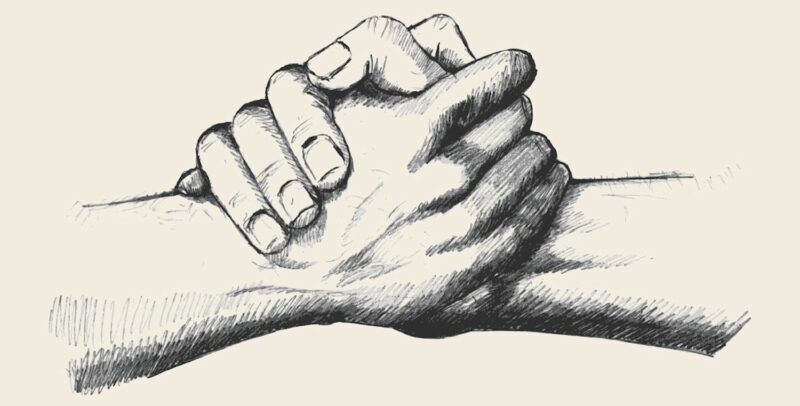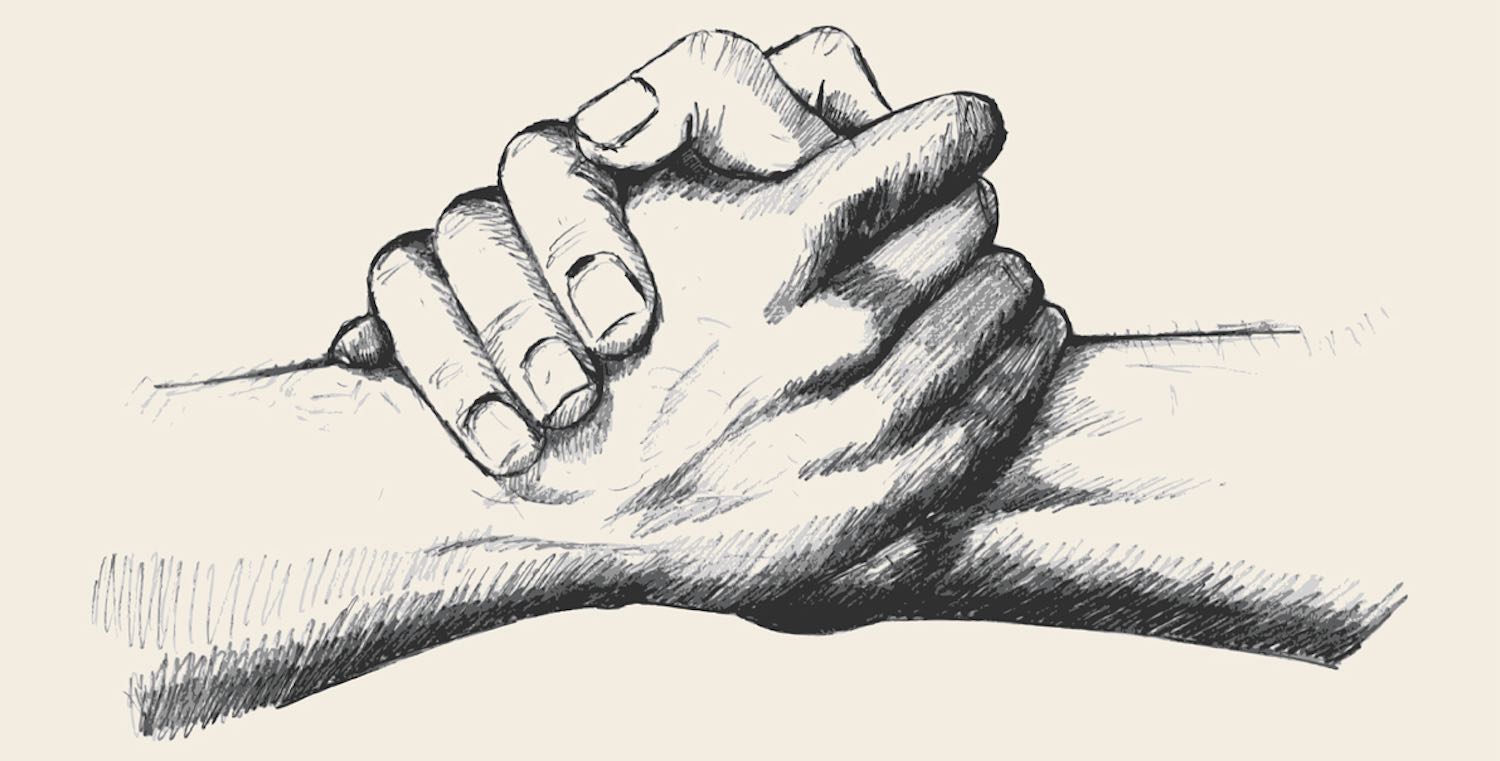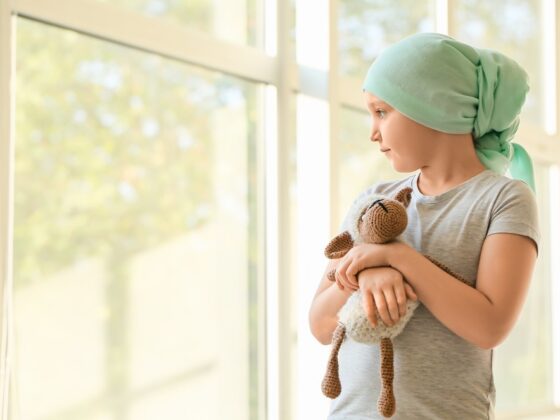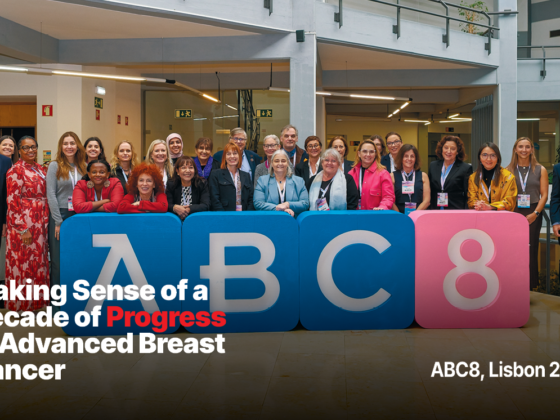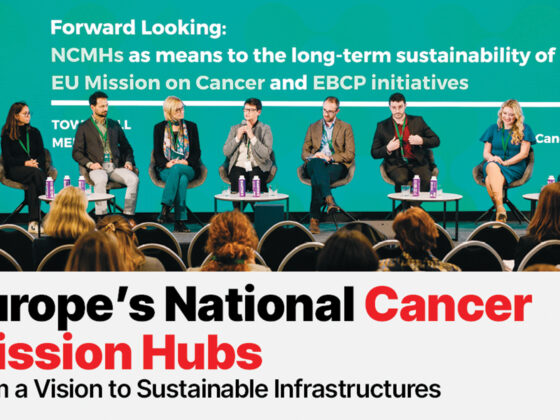A few days after being diagnosed with cancer, at only 32 years of age, Katarzyna Chmielewska-Wojciechowska met a friend who asked, in passing, how she was doing. She told him. His response was to sympathise and offer reassurance. He knew how she felt, because his father had been through it. “But dad had the worst cancer – pancreatic,” he volunteered, encouraging her to look at the bright side. “I just got that cancer too,” Katarzyna replied. Her friend looked suitably embarrassed.
While that exchange may be a particularly cringe-worthy example, the truth is that most of us find it hard to know what to say to someone who reveals that they have been diagnosed with cancer. It’s a common problem, says Joanna Pruban, a psycho-oncologist at the Department of Oncology and Oncological Surgery for Children and Adolescents at Warsaw’s Institute of Mother and Child. “Just as the patient at the beginning does not know what to do with themselves, family and friends are also often left feeling helpless.”
A nationwide survey commissioned in Poland by several cancer advocacy organisations revealed that only one in three people who had someone close to them diagnosed with cancer reported that they had ‘no problem’ with reacting to the news. Younger respondents struggled more, with 79% aged between 18 and 49 years indicating difficulties in knowing what to say to someone who reveals they have cancer. That compares with 61% among respondents aged between 50 and 59 years and 64% of those aged 60 years and older.
“I suspect that this is due to life experience,” comments Chmielewska-Wojciechowska. Despite the young age at which she herself was diagnosed, she already had the dubious benefit of personal experience with cancer, as her stepfather had died of cancer and her mother was also living with the disease. “I remembered her first reaction, which was very open and made it easier for us to talk about it. I chose the same path, and since I’m an extrovert and a direct person, I don’t like to beat around the bush. I gave others a signal: you can talk to me about cancer honestly and tell me directly what you feel.”
The reaction was not always that helpful, she adds; when some friends found out that she had cancer at such a young age, they would sometimes start crying in front of her: “I was the one who had to console them, playing the role of the heroine, which was even more irritating,” she says. She subsequently set up the Life with Cancer foundation to help others in a similar situation.
Do offer support and encouragement
Most people confronting a cancer diagnosis in themselves or loved ones have less personal experience of the disease than Chmielewska-Wojciechowska. As Pruban explains, the diagnosis usually comes as a shock, and before patients and family are able to make sense of the precise details of their disease and its potential management, their first reactions are often based on widely held but inaccurate assumptions about cancer, or maybe on bad experiences they heard about many years ago.
This was the case for the Polish celebrity couple, footballer Jarosław Bieniuk and Anna Przybylska, the much-loved actress, who was diagnosed with pancreatic cancer in 2013, aged 34, and died a year later. “The first reaction to my wife’s cancer was confusion,” says Bieniuk. “No one in our families had had cancer before, so we were in the dark.”
The truth about pancreatic cancer, he says, “was brutal, and difficult for us to accept,” and while some close friends did their best to help, others just cut off contact. Bieniuk’s own first response on hearing his wife’s diagnosis, he says, was “Honey, we got this!” Those words, he says, encouraged them to look for help, on the Internet and among their circle of friends.
Bieniuk is now an ambassador for the ‘Just Two Words’ campaign (Tylko dwa słowa), which – alongside raising awareness about progress in treating cancer – highlights the emotional needs of cancer patients and the importance of words of solidarity and support. Words like “I’m here”, which the actress/singer Karolina Nowakowska, another ambassador for the ‘Just Two Words’ campaign, now says she wishes she had said when her actor/film director father Marek Nowakowski, was diagnosed with cancer, “to let him know that he could count on me, especially then.”
What she actually did say was, “It’s going to be fine,” which, as she now realises, was not true.
Don’t offer false reassurance
When someone has well-founded worries about what will happen next, denying obvious facts and patting them on the shoulder is “not necessarily a serious approach,” says Anna Kupiecka, who heads up the OnkoCafe, a Polish patient support organisation. When she was diagnosed with an aggressive breast cancer 12 years ago, she spent a long time in denial, hoping – and half expecting to hear – that it had all been a dreadful mistake: an error in the mammography, an overzealous doctor… She now understands better than anyone that, when you receive a cancer diagnosis, you need support to face the reality of that diagnosis and make good decisions about what to do.
Iwona Nawara, founder and organiser of the Unicorn Psycho-oncology Centre in Kraków, agrees with this approach. “I do not encourage ‘positive thinking’, but instead healthy, rational thinking.” She says that patients frequently tell her that the knee-jerk reaction to the news of their cancer diagnosis from people around them is to provide false reassurance: “Don’t cry, it will be fine!”
When you receive a cancer diagnosis, you need support to face the reality of that diagnosis and make good decisions about what to do
The impact is often the opposite to what was intended, stresses Nawara, because they’re talking to a person who feels that the world has just collapsed on their head, and has a hard time seeing any future ahead of them or seeing a way out. “Well-meaning people who suggest you should smile at such a moment appear to the patient as if they are somehow behind a window; there is no understanding of the situation in which their friend actually finds themselves,” she says. “Instead of trying to use slogans, it’s better to admit openly: “I don’t know what to tell you.”
Think before you ask: How are you?
While enquiring about someone’s health is generally interpreted as a friendly casual enquiry, it acquires a very different meaning for people experiencing major, potentially life threatening, health problems, as Pruban found out when she took up her post at the Institute of Mother and Child Hospital. When she asked teenage patients for tips on how to talk to them, they listed “How are you feeling?” as one of the questions they most disliked.
Today she knows why: “We shouldn’t start the conversation like that, because the honest answer ‘I feel terrible, I’m angry, I’m afraid’ requires exposing feelings that the patient does not always want to share with everyone. By asking how someone feels, we force them to pretend that everything is fine.”
Teenage patients listed “How are you feeling?” as one of the questions they most disliked
Kupiecka remembers hating being that person who was throwing up in the toilet and showing up bald after chemo. She felt a failure and a burden on others. But she also remembers with gratitude the practical support close friends and family gave to help her through those times. “After each cycle of chemotherapy, a friend came to pick me up at the hospital, took me to my parents, and I ate broth at their place. I vomited and walked around with a bald head with no eyelashes – this allowed them to be with me. They didn’t have to guess how I felt. They saw it.”
Chmielewska-Wojciechowska avoided conversations with anyone for a long time because she found it tiring to answer similar questions from ten different people who were concerned for her health. Her advice: put a filter on. “I passed information to my husband and aunt, and they continued to spread the updates to the rest of the family. This allowed me to cut down on the number of calls pretty quickly, even those who meant well.
What she really wanted from her friends, she says, was to talk about ‘normal things’. “I understood quite quickly that if they dragged me into the current that was the disease, I would get pulled into it, but instead, I wanted to immerse myself in the relatively ordinary life of a wife and a young mother.”
She too highlights the value of offers of practical help, and credits her brother-in-law for hitting the right note – We are ready to help, just give us tasks. We won’t be calling every day, shopping, or cooking you dinner, but if you need it, say so and it’ll be done. “It was spot on,” she recalls.
Be there for the journey
Kupiecka points out that, as medical progress enables people to live longer even with advanced cancers, the nature of cancer conversations is also changing. It’s not so much a question of having more time for ‘that conversation’, as a need for many conversations along a journey of many years.
Chmielewska-Wojciechowska adds that a cancer diagnosis doesn’t just require drawing up a long-term treatment plan, “but also contributes to the reorganisation of one’s entire life, i.e. assigning new roles in it.” That is quite demanding on both the person with cancer and the people around them, says Pruban. “Staying in a constant dialogue with the patient to directly communicate feelings and guide each other to their needs can be the greatest challenge for both parties.” Indeed, it is relatives rather than cancer patients themselves who make up the majority of those who contact Life with Cancer for advice, says Chmielewska-Wojciechowska.
“Staying in a constant dialogue to communicate feelings and needs can be the greatest challenge for both parties”
Sometimes it takes more than just words, stresses Kupiecka. “I recommend that you pay close attention,” she advises. “Grabbing a coffee together is sometimes just not enough. But making a ‘Call me when you need me’ offer opens a door to more. Maybe I’ll never call and use it. But I know I can.”
Sometimes words can even get in the way. Not everything can be talked away, and silent understanding can be more helpful. Even now, after launching Life with Cancer to support people going through similar experiences, Chmielewska-Wojciechowska, admits she can occasionally feel very isolated. “When my husband drops me off at chemotherapy, I feel terribly lonely. And no one can take this burden off me.” She says people are often surprised to hear that she sometimes needs solitude and quiet.
Knowing the right thing to do or say at the right time, comes down to empathy, Pruban concludes. “Try to look at the situation through the eyes of the patient,” she advises. If we were in that difficult position, what we would need to hear from our own friends and family?

